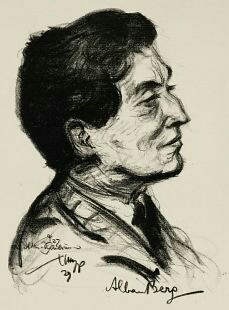Alban Berg
Alban Berg (February 9, 1885 – December 24, 1935) was an Austrian composer of the late Romantic era and early 20th century, who played a key role in the development of atonality and the twelve-tone technique within classical music. Berg was a member of the Second Viennese School, a group of composers that included his teacher Arnold Schoenberg and fellow student Anton Webern, which was pivotal in pushing the boundaries of harmony and musical structure.
Biography[edit | edit source]
Born in Vienna, Austria, Berg was initially self-taught in music but later studied under Arnold Schoenberg. His early works were late-Romantic in style, but he soon adopted the atonal method of composition that Schoenberg developed, though Berg's music is often considered more emotional and accessible than that of his teacher or Webern.
Berg's most notable compositions include the operas Wozzeck and Lulu, which are among the most important operas of the 20th century. Wozzeck, based on the play Woyzeck by Georg Büchner, was completed in 1922 and is notable for its innovative use of atonality and its exploration of the human psyche and society. Lulu, left incomplete at Berg's death and later finished by Friedrich Cerha, is equally renowned for its complex characters and sophisticated use of the twelve-tone technique.
Berg also composed a number of other significant works, including the Chamber Concerto for violin, piano, and 13 wind instruments, which was intended as a homage to Schoenberg, and the Lyric Suite, a highly personal work that utilizes the twelve-tone technique in a deeply expressive manner.
Legacy[edit | edit source]
Berg's contribution to music was significant in the way he combined the twelve-tone technique with lyrical, romantic elements, making his work a bridge between the 19th and 20th centuries. His ability to infuse atonal music with emotional depth has made his compositions enduringly popular and influential among both musicians and audiences.
Berg died from septicemia on December 24, 1935, in Vienna. His death marked the loss of one of the most important composers of his generation. Today, his works are performed regularly and continue to be studied for their innovative approach to composition and their emotional impact.
Selected Works[edit | edit source]
- Wozzeck (1922)
- Lulu (Incomplete at Berg's death, completed by Friedrich Cerha in the 1970s)
- Chamber Concerto (1925)
- Lyric Suite (1926)
- Violin Concerto (1935), dedicated "To the memory of an angel", referring to Manon Gropius, the daughter of Alma Mahler and Walter Gropius.
See Also[edit | edit source]
Search WikiMD
Ad.Tired of being Overweight? Try W8MD's physician weight loss program.
Semaglutide (Ozempic / Wegovy and Tirzepatide (Mounjaro / Zepbound) available.
Advertise on WikiMD
|
WikiMD's Wellness Encyclopedia |
| Let Food Be Thy Medicine Medicine Thy Food - Hippocrates |
Translate this page: - East Asian
中文,
日本,
한국어,
South Asian
हिन्दी,
தமிழ்,
తెలుగు,
Urdu,
ಕನ್ನಡ,
Southeast Asian
Indonesian,
Vietnamese,
Thai,
မြန်မာဘာသာ,
বাংলা
European
español,
Deutsch,
français,
Greek,
português do Brasil,
polski,
română,
русский,
Nederlands,
norsk,
svenska,
suomi,
Italian
Middle Eastern & African
عربى,
Turkish,
Persian,
Hebrew,
Afrikaans,
isiZulu,
Kiswahili,
Other
Bulgarian,
Hungarian,
Czech,
Swedish,
മലയാളം,
मराठी,
ਪੰਜਾਬੀ,
ગુજરાતી,
Portuguese,
Ukrainian
Medical Disclaimer: WikiMD is not a substitute for professional medical advice. The information on WikiMD is provided as an information resource only, may be incorrect, outdated or misleading, and is not to be used or relied on for any diagnostic or treatment purposes. Please consult your health care provider before making any healthcare decisions or for guidance about a specific medical condition. WikiMD expressly disclaims responsibility, and shall have no liability, for any damages, loss, injury, or liability whatsoever suffered as a result of your reliance on the information contained in this site. By visiting this site you agree to the foregoing terms and conditions, which may from time to time be changed or supplemented by WikiMD. If you do not agree to the foregoing terms and conditions, you should not enter or use this site. See full disclaimer.
Credits:Most images are courtesy of Wikimedia commons, and templates, categories Wikipedia, licensed under CC BY SA or similar.
Contributors: Prab R. Tumpati, MD



